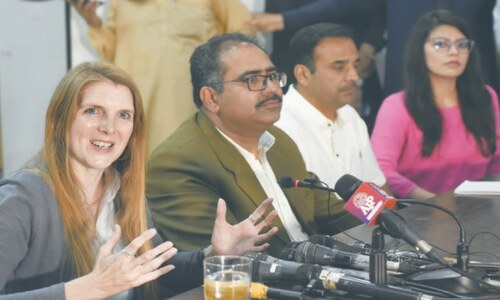ISLAMABAD: Six short documentary films addressing social issues produced by student filmmakers were presented at Kuch Khaas on Tuesday. The event, organised by Rutgers World Population Fund, aimed at using film as a medium for social change.
The films raised topics such as domestic violence, Human Immunodeficiency Virus Infection and Acquired Immune Deficiency Syndrome (HIV/Aids) and child marriages.
A series of workshops were arranged at Bahria University and Shaheed Zulfiqar Ali Bhutto Institute of Science and Technology (SZABIST) which trained undergraduate students in documentary filmmaking and research techniques.
The film made by students, Rukhna Abbasi, Asfrah Vaqar and Anum Bhatti, from SZABIST University showed how transfusion of unscreened blood can transmit HIV and other life threatening viruses.
“We want to talk about HIV because it has become a taboo topic is our society,” said Rukhna Abbasi.
Ayaz Khan, Faiza Iqbal and Soniya said making their film on domestic abuse taught them how difficult filmmaking can be. The biggest challenge students faced was convincing victims of domestic violence to come forward and talk.
“We chose the subject because it is so prevalent. As we researched for the film, we found out that women of all ages are victims of abuse,” said Ayaz Khan who made the film ‘Seeking Shelter’.
Mohammad Akram and Abbas Qasmi from Bahria University presented a film titled ‘Born with it’ which also focused on HIV. The film showed that HIV is not just transmitted through sexual contact.
“We wanted to tell people to hate the disease and not the victim,” said Abbas Qasmi.
Judges were impressed by the powerful messages in the films and appreciated the efforts of the students. Some judges offered feedback to help students with future projects.
Samar Minallah, one of the judges, suggested that solutions should be discussed not just problems. Misha Rezvi suggested that students should present stories of victims. “It makes a documentary more powerful and people would like to hear their stories in their own voice,” said Misha Rezvi.
The panelists also asked students to use less narration, local music and preferably local languages for greater impact. Mohammad Akram and Abbas Qasmi from Bahria University made the documentary ‘Born with it’.
The film showed how blood transfusion and sexual contact were not the only reasons behind contracting HIV.
Published in Dawn, December 17th, 2014















































Dear visitor, the comments section is undergoing an overhaul and will return soon.